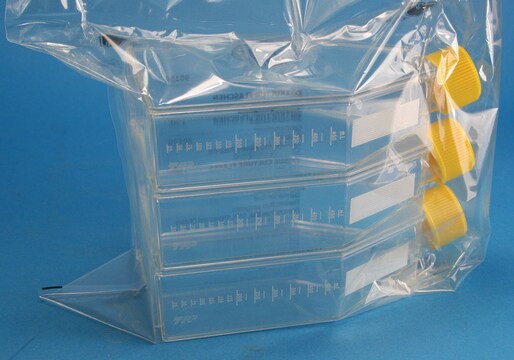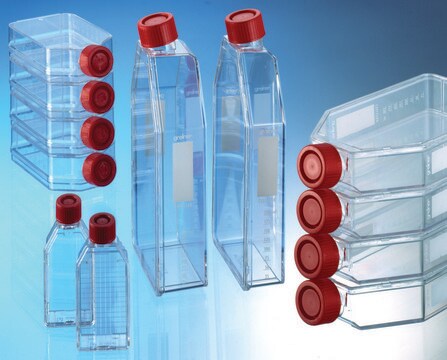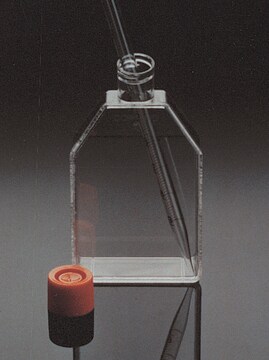Z707503
TPP® tissue culture flasks
Synonym(s):
T75 flask, cell culture flask, tissue culture flask
Sign Into View Organizational & Contract Pricing
All Photos(1)
About This Item
UNSPSC Code:
41122104
NACRES:
NB.22
Recommended Products
material
angled neck
polystyrene
screw top cap
sterility
sterile
feature
with cap vented
packaging
case of 100
pack of 5
manufacturer/tradename
TPP 90075
capacity
65 mL
external L × W × H
150 mm × 85 mm × 35 mm
surface area
75 cm2 , growth surface (cm2)
working volume
8-15 mL
suitability
suitable for (cell culture; tissue culture)
binding type
Tissue Culture (TC)-treated surface
Looking for similar products? Visit Product Comparison Guide
General description
TPP Tissue Culture Flasks
Inside surface treatment by TPP provides an optimal growth surface on the flask base for the most varied matrix-dependent tissue cultures. The untreated side and top inside surfaces reduce the amount of cell loss during the separation phases, because undesired tissue adhesion outside the growth zone is diminished.
The flask′s innovative shape is of such a design that devices inserted through the flask′s neck have optimal access to the entire base surface. This means that there are no "dead" corners that cannot be reached with pipettes or cell scrapers. This excellent accessibility is due to the large neck opening and the favorable angle of inclination. The angled neck also reduces the chance of accidental spills and permits "dribble-free" pouring.
The TPP filter cap has a welded membrane in the cap cavity to offer free gas exchange without gas flow alteration. For optimal flask breathing, all membranes are proportionally dimensioned to each cap size. The microporous hydrophobic membrane (cytotoxic free) itself is constructed of 2 layers of membrane material based on a white acrylic copolymer over nylon support. With an airflow rate of 4.5 (LPM /3.7 cm2/ 13.5 psi), the gas exchange properties of the filtered flasks are comparable to that of the standard cap flasks.
The TPP tissue culture flasks stand for high quality aspects.
Advantages of the tissue culture flask:
For optimum tissue growth, the growth area is opto-mechanical treated. This enhances cell adhesion and cell growth.
The geometry of the neck guarantees total access of TPP pipettes, TPP scrappers and the TPP spatula.
Inside surface treatment by TPP provides an optimal growth surface on the flask base for the most varied matrix-dependent tissue cultures. The untreated side and top inside surfaces reduce the amount of cell loss during the separation phases, because undesired tissue adhesion outside the growth zone is diminished.
The flask′s innovative shape is of such a design that devices inserted through the flask′s neck have optimal access to the entire base surface. This means that there are no "dead" corners that cannot be reached with pipettes or cell scrapers. This excellent accessibility is due to the large neck opening and the favorable angle of inclination. The angled neck also reduces the chance of accidental spills and permits "dribble-free" pouring.
The TPP filter cap has a welded membrane in the cap cavity to offer free gas exchange without gas flow alteration. For optimal flask breathing, all membranes are proportionally dimensioned to each cap size. The microporous hydrophobic membrane (cytotoxic free) itself is constructed of 2 layers of membrane material based on a white acrylic copolymer over nylon support. With an airflow rate of 4.5 (LPM /3.7 cm2/ 13.5 psi), the gas exchange properties of the filtered flasks are comparable to that of the standard cap flasks.
The TPP tissue culture flasks stand for high quality aspects.
Advantages of the tissue culture flask:
- Uniform even surface of the growth area
- Crystal clear transparency
- Stable, slip-free stacking of several flasks
- Bilateral marking area
- Accurate volume scale for optic control of the filling volume
- Excellent access of pipettes, tissue scrapers and tissue spatula
- Marking area with lines on both sides to allow your identification
- Increased overflow height reduces the danger of slopover of media
- "VENT" and filter screw caps
For optimum tissue growth, the growth area is opto-mechanical treated. This enhances cell adhesion and cell growth.
The geometry of the neck guarantees total access of TPP pipettes, TPP scrappers and the TPP spatula.
The inside surface treatment by TPP provides an optimal growth surface on the flask base for the most varied matrix-dependent tissue cultures. The untreated side and top inside surfaces reduce the amount of cell loss during the separation phases, because undesired tissue adhesion outside the growth zone is diminished. The flask′s innovative shape is of such a design that devices inserted through the flask′s neck have optimal access to the entire base surface. This means that there are no "dead" corners that cannot be reached with pipettes or cell scrapers.
This excellent accessibility is due to the large neck opening and the favorable angle of inclination. The angled neck also reduces the chance of accidental spills and permits "dribble-free" pouring.
When the vented screw cap is tightened to the end position, the closed tissue culture flask is liquid and gas tight. By simply unscrewing the cap one quarter of a turn, the flask is in the "VENT" position, with the inside of the flask being aerated through a defined gap opening. This guarantees that the gas exchange with the environment and the possible risk of contamination are kept to a minimum. In addition, the special flat thread profile of the caps stops excess tightening and thus allows the caps to be re-used multiple times.
The TPP filter cap has a welded membrane in the cap cavity to offer free gas exchange without gas flow alteration. For optimal flask breathing, all membranes are proportionally dimensioned to each cap size. The microporous hydrophobic membrane (cytotoxic free) itself is constructed of 2 layers of membrane material based on a white acrylic copolymer over nylon support. With an airflow rate of 4.5 (LPM/3.7cm2/13.5psi), the gas exchange properties of the filtered flasks are comparable to that of the standard cap flasks.
This excellent accessibility is due to the large neck opening and the favorable angle of inclination. The angled neck also reduces the chance of accidental spills and permits "dribble-free" pouring.
When the vented screw cap is tightened to the end position, the closed tissue culture flask is liquid and gas tight. By simply unscrewing the cap one quarter of a turn, the flask is in the "VENT" position, with the inside of the flask being aerated through a defined gap opening. This guarantees that the gas exchange with the environment and the possible risk of contamination are kept to a minimum. In addition, the special flat thread profile of the caps stops excess tightening and thus allows the caps to be re-used multiple times.
The TPP filter cap has a welded membrane in the cap cavity to offer free gas exchange without gas flow alteration. For optimal flask breathing, all membranes are proportionally dimensioned to each cap size. The microporous hydrophobic membrane (cytotoxic free) itself is constructed of 2 layers of membrane material based on a white acrylic copolymer over nylon support. With an airflow rate of 4.5 (LPM/3.7cm2/13.5psi), the gas exchange properties of the filtered flasks are comparable to that of the standard cap flasks.
Legal Information
TPP is a registered trademark of TPP Techno Plastic Products AG
Choose from one of the most recent versions:
Already Own This Product?
Find documentation for the products that you have recently purchased in the Document Library.
Customers Also Viewed
Our team of scientists has experience in all areas of research including Life Science, Material Science, Chemical Synthesis, Chromatography, Analytical and many others.
Contact Technical Service



